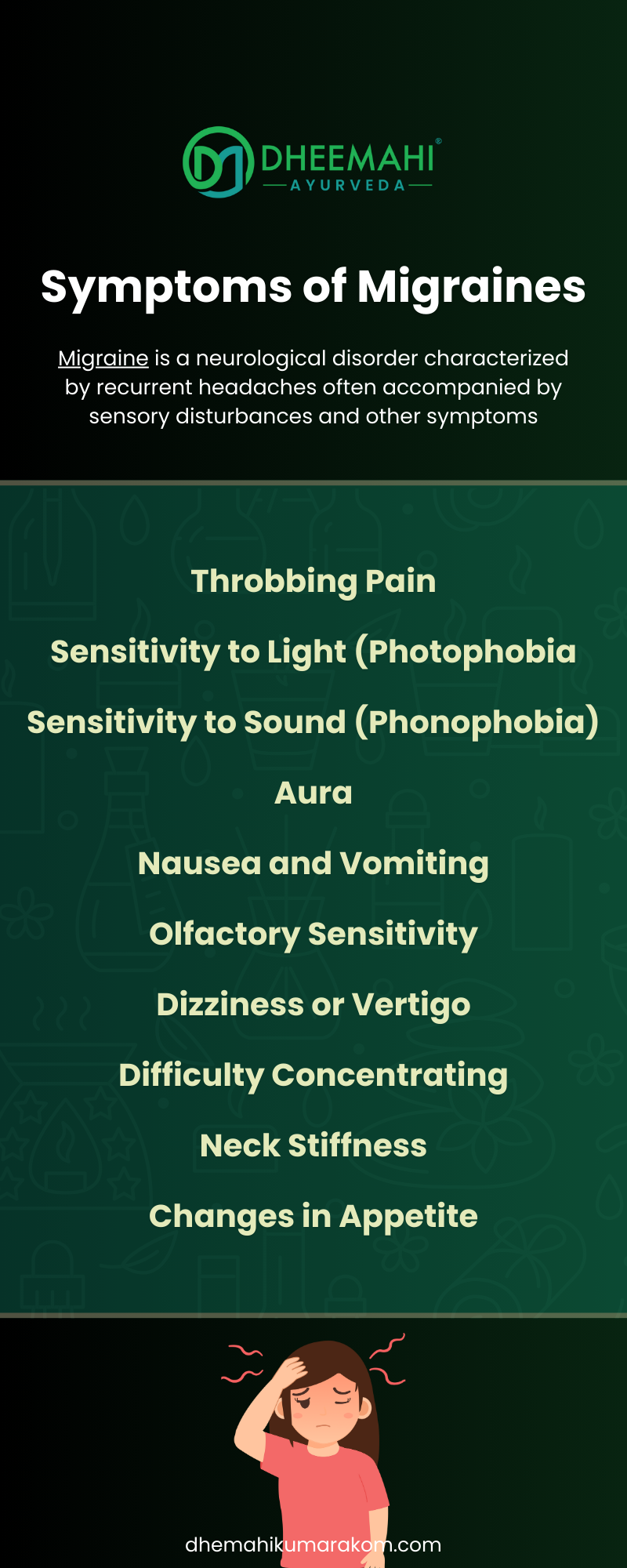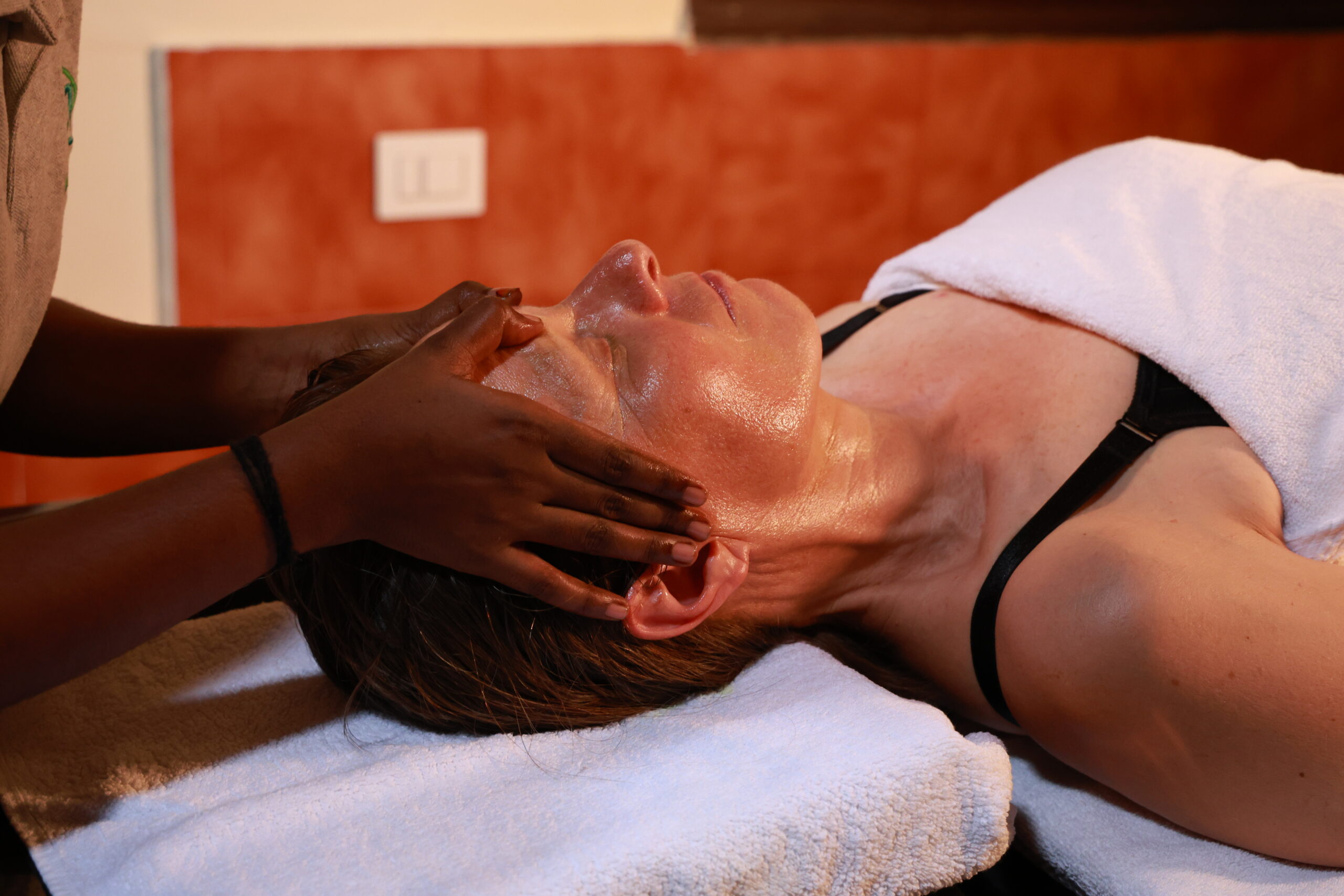Symptoms, causes, and Ayurvedic Treatment for Migraine
Dr. Amritha B.A.M.S
Migraine is a neurological disorder characterized by recurrent headaches often accompanied by sensory disturbances and other symptoms. While there’s no cure for migraines, various treatment options exist to alleviate symptoms, reduce the frequency of attacks, and improve the quality of life for individuals living with this condition.
Symptoms of Migraines
Throbbing Pain: Pulsating headache that typically affects one side of the head. This pain can be debilitating, making it difficult to carry out daily activities.
Sensitivity to Light (Photophobia): Many migraine sufferers experience heightened sensitivity to light, known as photophobia. Exposure to bright lights or sunlight during a migraine attack can intensify the headache and discomfort.
Sensitivity to Sound (Phonophobia): Alongside sensitivity to light, individuals with migraines often have an increased sensitivity to sound or phonophobia. Even normal sounds may feel amplified and aggravate the headache.
Aura: Some experience sensory disturbances known as aura before or during the headache phase. Visual aura is the most common, manifesting as light flashes, zigzag lines, or temporary vision loss. Other types of aura may involve sensory changes, such as tingling sensations or numbness in the face or limbs.
Nausea and Vomiting: Nausea and vomiting are frequent companions of migraine headaches, further adding to the distress experienced during an attack. These gastrointestinal symptoms can exacerbate feelings of discomfort and debilitation.
Olfactory Sensitivity: Heightened sensitivity to odours, or osmophobia, is another common symptom of migraines. Certain smells, even those typically considered pleasant, can trigger or worsen migraine attacks in susceptible individuals.
Dizziness or Vertigo: Migraine can cause dizziness or vertigo, leading to a sense of imbalance or spinning sensations. These symptoms may occur alongside or independently of the headache phase.
Difficulty Concentrating: Migraine attacks often impair cognitive function, making it challenging to focus, concentrate, or perform mental tasks. This cognitive fog can persist throughout the headache and sometimes even beyond.
Neck Stiffness: Many migraine sufferers experience stiffness or tension in the neck and shoulder muscles, which can exacerbate headache pain and discomfort.
Changes in Appetite: Migraine attacks may alter appetite, leading to decreased food intake due to nausea or increased cravings for certain foods. These changes in eating patterns can further disrupt daily routines and exacerbate feelings of malaise.
Causes of Migraines
The exact cause of migraines is not fully understood, but it is believed to involve a combination of genetic, environmental, and neurological factors. Some common triggers for migraines include:
Hormonal changes: Fluctuations in estrogen levels, particularly in women, can trigger migraines.
Certain foods: Processed foods, aged cheeses, chocolate, and alcohol are known triggers for some individuals.
Stress: Emotional stress, anxiety, or tension can precipitate migraines.
Environmental factors: Bright lights, loud noises, strong smells, and weather changes can trigger migraines in susceptible individuals.
Sleep disturbances: Irregular sleep patterns or lack of sleep can contribute to migraine attacks.
Medications: Certain medications, including oral contraceptives and vasodilators, may trigger migraines in some people.
Ayurvedic Treatment for Migraine
Ayurvedic Treatment for Migraines in kerala addresses the root causes rather than just alleviating symptoms. It involves a combination of lifestyle modifications, dietary changes, and therapeutic interventions to restore balance and prevent future migraine episodes.
Migraine headache treatment in Ayurveda emphasizes the importance of a balanced lifestyle and a nourishing diet.
Some recommendations include the following:
Stress management: Practicing relaxation techniques such as meditation and gentle yoga can help reduce stress, a common trigger for migraines.
Regular sleep schedule: Maintaining a consistent sleep routine promotes deep rest and helps prevent migraines.
Avoiding trigger foods: Certain foods like processed meats, aged cheeses, and artificial additives can trigger migraines. Identifying and avoiding these triggers is crucial.
Hydration: Drinking adequate water throughout the day supports overall health and can prevent dehydration-related migraines.
Ayurveda offers effective therapies for managing migraines. These therapies focus on balancing the body and mind to address the root causes of migraines.
Here are some commonly used Ayurvedic therapies:
Shirodhara: medicines are poured onto the forehead to promote relaxation and relieve migraines caused by stress and tension.
Nasya: Medicated oils or herbal preparations are administered into the nasal passages to clear congestion and reduce sinus-related migraines.
Abhyanga: Therapeutic full-body massage with warm herbal oils improves circulation, reduces muscle tension
Mukhalepam: Herbal pastes and masks applied to the face reduce stress, improve blood circulation, and alleviate migraines triggered by facial tension.
Panchakarma: This detoxification and rejuvenation therapy eliminates toxins, restores balance, and addresses imbalances contributing to migraines.
These Ayurvedic therapies, when combined with herbal remedies, lifestyle modifications, and a healthy diet, provide a comprehensive approach to effectively managing migraines.
Yoga and Meditation for Migraine Prevention
Yoga and meditation are integral parts of Ayurvedic treatment for migraine headaches. Certain yoga asanas (postures) and meditation techniques can help reduce stress, improve blood flow, and promote overall well-being. Practices like Shavasana (corpse pose), Anulom Vilom (alternate nostril breathing), and Bhramari Pranayama (bee breath) are particularly beneficial for managing migraines.
Pranayama Techniques for Migraine Relief
Pranayama, the practice of controlled breathing, can be highly effective in relieving migraines. Techniques like Sheetali Pranayama (cooling breath) and Kapalabhati (skull-shining breath) help calm the mind, release tension, and balance the doshas.
Ayurvedic Self-Care Practices for Migraines
In addition to specific treatments and therapies, Ayurveda emphasises self-care practices that can support migraine management. Some self-care practices include:
Adequate rest: Taking breaks and allowing time to relax and rejuvenate can prevent stress accumulation and reduce the risk of migraines.
Scalp massage: Massaging the scalp with herbal oils can improve blood circulation to the head and relieve migraines.
Hot and cold therapy: Applying hot or cold compresses to the head and neck can help alleviate pain and reduce inflammation.
Managing Stress and Emotions
Stress and emotional imbalances can contribute to migraines. Ayurveda emphasises managing stress through lifestyle modifications, mindfulness practices, and herbal support. Addressing emotional well-being through journaling, counselling, and practising gratitude can help prevent migraines.
Ayurvedic Migraine Treatment in Dheemahi
Dheemahi Ayurveda boasts a team of expert doctors who bring knowledge and experience to the forefront. Rooted in traditional Ayurvedic practices, these experts integrate ancient wisdom with modern medical understanding, creating a dynamic and practical approach to patient care.
Holistic healthcare requires ongoing attention, and Dheemahi Ayurveda recognises the significance of regular consultations and follow-up check-ups. This commitment ensures that patients receive continuous support, with doctors monitoring progress and making necessary adjustments to treatment plans as needed.
Dheemahi Ayurveda goes beyond treating symptoms by acknowledging the interconnectedness of mental and physical well-being. The emphasis on the mind’s role in achieving a healthy life reflects a holistic understanding of health, where mental and emotional balance is considered integral to overall wellness.
The unique strength of Dheemahi Ayurveda lies in its ability to combine the knowledge of the past five generations with contemporary healthcare practices. This synergy results in a comprehensive and dynamic approach to patient care, ensuring that traditional wisdom evolves to meet the changing needs. Transparency and accountability are key pillars of Dheemahi Ayurveda’s healthcare process.
Documenting treatment schedules provides patients with a clear understanding of their therapeutic journey, fostering trust and confidence in the authenticity and effectiveness of Migraine Ayurvedic treatments.
How Our Booking Process Works
The unique approach involves a series of discussion during your initial decision-making process to make sure that we will be able to match your expectations with our treatment.
Based on the discussions with you our team of expert doctors will design the best treatment package personalized for your needs.
01
Consultation Form
Fill out our consultation form, and let us know when will you be available for our doctor to talk to you
02
Discussion with Doctor
Discuss your health condition and expectations with our doctor.
03
Booking Confirmation
Confirm the booking by making a payment of 50% advance.
Consultation Form
Submit this form to initiate a booking with us
Have any queries? We will help you. Talk to us now
Say Goodbye to Health Woes & Hello to Healthy Living
Dheemahi Ayurvedic Pvt Ltd
12/386 Varaputhara Road
Kumarakom, Kerala, India
Pin 686563
Dheemahi Ayurvedic Centre, Near Neelimangalam Bridge, Kumaranaloor, Perumbaikad.P.O, Kottayam, Kerala, India, Pin 686016
Other Treatments
Karkidaka Chikilsa | Ayurvedic Treatment for Depression | How to Reduce Stress Naturally | Autoimmune Disorders | Mental Health Ayurvedic Treatment | Weight-Loss Treatment | Frozen Shoulder Ayurvedic Treatment | Diabetes Ayurvedic Treatment | PCOS Ayurvedic Treatment | Celiac Disease Treatment | ayurvedic treatment for skin diseases | nervous system ayurvedic treatment | Back Pain Ayurvedic Treatment | Cervical Spondylitis Ayurvedic Treatment | ayurvedic treatment for blood sugar | Fatty Liver Ayurvedic Treatment | Knee Pain Ayurvedic Treatment | Migraine Ayurvedic Treatment | Osteoarthritis Ayurvedic Treatment | Psoriasis Ayurvedic Treatment | Sinusitis Ayurvedic Treatment | Ayurvedic Detox Treatment | Migraine Ayurvedic Treatment | Ayurvedic Treatment for Rheumatoid Arthritis | Ayurvedic treatment for joint pain | Ayurvedic treatment for ulcerative colitis | Panchakarma Treatment |


